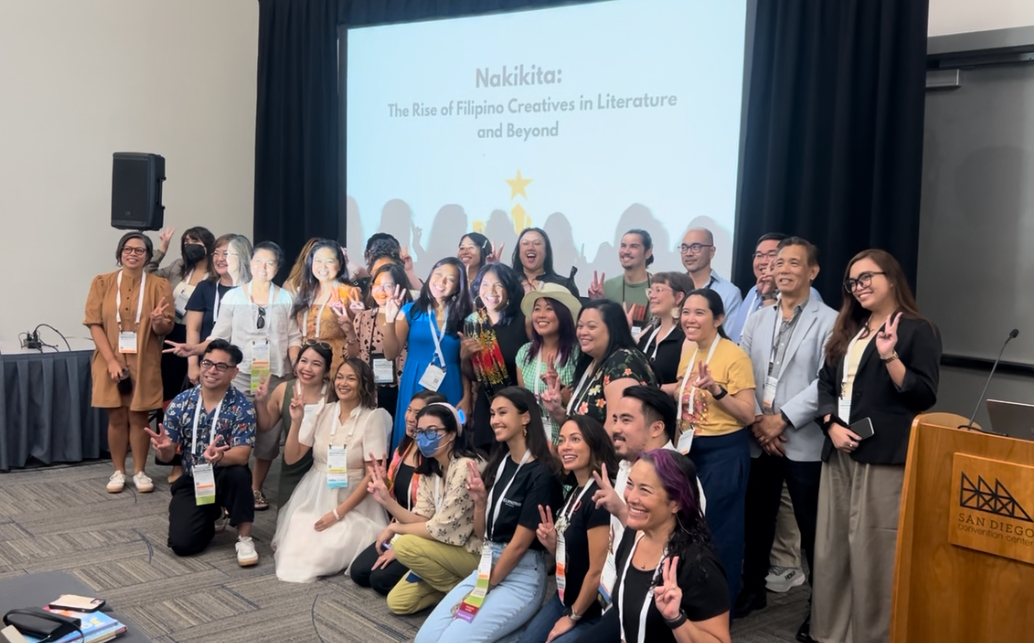Nakikita: The Rise of Filipino Creatives in Literature and Beyond at #ALAAC24

Nakikita, a Tagolog verb meaning “to see something; to catch sight of something; to be seen,” was a poignant way to capture the striking moment of representation at the APALA President’s Program at the ALA Annual Conference. The panel consisted entirely of Filipino American writers and creatives. As the APALA president herself remarked, it may have been the first occurrence of an all-Filipino program at ALA.
The panel started with an introduction, which quickly shifted to an enthusiastic celebration of the panelists achievements. The lineup included: Maritress Zurbano, an author, magician, and creator of Decolonized Tarot; Rachell R. Abalos, a school librarian and kidlit author; Randy Ribay, a young adult fiction author; and Mae Respicio, a middle grade fiction author. Moderator Jaena Rae Cabrera is the President of the Asian Pacific American Library Association (APALA) and a San Francisco Public Library Branch Manager. Cabrera also serves as a member of PLA’s Equity, Diversity, Inclusion, and Social Justice committee.
Cabrera’s question to the panelists: “How does it feel to be a Filipino creative in a predominantly white industry?” sparked a profound discussion about the challenges that Filipinos and many people of color face in publishing and creative industries, as well as the spirit of resistance that shapes how they move about these industries. With their unique perspectives, the panelists shared the challenges they face in the publishing and creative industries. They described their underlying motivations to tell their authentic stories and their refusal to be pitted against other people of color and other Asians despite attempts by publishers to do so. Ribay particularly credited “a century of Black artists pushing boundaries in media and culture” leading up to the current moment of increased visibility and opportunities for Filipino creatives.
Despite this moment of visibility, Filipino creatives, particularly writers, face hardship in the publishing industry. The panelists described countless experiences of rejection from agents who claimed to have enough “comparable stories” (subtext: other Asian stories, even if they’re not similar), or editors who questioned the authenticity of their stories. As Abalos remarked, “landing the deal is only half the battle— [you’ll be] fighting until the ink dries”.
How do these successful authors persevere through infuriating experiences and roadblocks in the creative world? The panelists united on the necessity of being in a strong and encouraging community with other Filipinos and others who share similar struggles. Respicio noted her practice of uplifting kabayans (fellow Filipinos) by leaving positive reviews on their books or projects. Ribay mentioned that his publishing team consists of women of color who understand the unique challenges in the industry.
The Q&A discussion revealed such an encouraging community already in practice. An audience member asked a question about the challenge of Filipino and diverse representation in school libraries, particularly with a student body that doesn’t have many Filipinos. Almost instantly, dozens of audience members raised their hands, excited to offer up a plethora of ideas and solutions. Abalos, a school librarian herself, offered her practice of daily storytimes. An audience member suggested using the prompt “If you liked this title, you might like…” when making diverse book recommendations to students and parents. Others from the audience piped in with ideas from book clubs to looking for community partners and grants to hosting a “diversity day.”
This program lived up to its title and was a historic and heartwarming sight to witness. As the American Library Association grows in its commitment to diverse communities that make up the library field, its programs must represent these communities accordingly. The packed program room full of Filipino library workers, writers, and other people of color and allies, is a testament to the importance of diverse representation at the ALA Conference.









